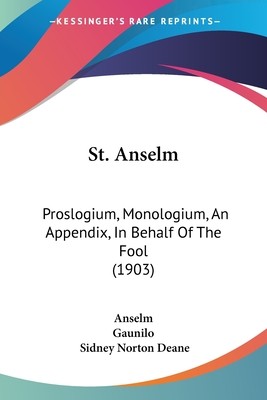
- We will send in 10–14 business days.
- Author: Anselm
- Publisher: Kessinger Publishing
- ISBN-10: 1437120180
- ISBN-13: 9781437120189
- Format: 15.2 x 22.9 x 1.8 cm, softcover
- Language: English
- SAVE -10% with code: EXTRA
Reviews
Description
The Proslogion (also spelled Proslogium; English translation of title: Discourse on the Existence of God), written in 1077-1078, was an attempt by the medieval cleric Anselm to prove beyond contention the existence of god.
Anselm wrote this discourse, not from the perspective of an attempt to convince non-Christians of the truth of Christianity, but rather from the perspective of a believer seeking a rationale for faith. His original title for the discourse was Faith Seeking Understanding. The Proslogion is the source for Anselm's famous, highly controversial ontological argument for the existence of god--that is, the argument in favor of god's existence by definition. While opinions concerning the ontological argument vary widely, it is generally agreed that the argument is most convincing to Anselm's intended audience, Christian believers seeking a rational basis for their beliefs.
The Argument--Dr. Scott H. Moore:
"One can imagine a being than which none greater can be conceived.
We know that existence in reality is greater than existence in the mind alone. If the being we imagine exists only in our mind, then it is not a "being than which none greater can be conceived". A being than which none greater can be conceived must also exist in reality. Failure to exist in reality would be failure to be a being than which none greater can be conceived. Thus a being than which none greater can be conceived must exist, & we call this being god."
EXTRA 10 % discount with code: EXTRA
The promotion ends in 19d.15:18:46
The discount code is valid when purchasing from 10 €. Discounts do not stack.
- Author: Anselm
- Publisher: Kessinger Publishing
- ISBN-10: 1437120180
- ISBN-13: 9781437120189
- Format: 15.2 x 22.9 x 1.8 cm, softcover
- Language: English English
The Proslogion (also spelled Proslogium; English translation of title: Discourse on the Existence of God), written in 1077-1078, was an attempt by the medieval cleric Anselm to prove beyond contention the existence of god.
Anselm wrote this discourse, not from the perspective of an attempt to convince non-Christians of the truth of Christianity, but rather from the perspective of a believer seeking a rationale for faith. His original title for the discourse was Faith Seeking Understanding. The Proslogion is the source for Anselm's famous, highly controversial ontological argument for the existence of god--that is, the argument in favor of god's existence by definition. While opinions concerning the ontological argument vary widely, it is generally agreed that the argument is most convincing to Anselm's intended audience, Christian believers seeking a rational basis for their beliefs.
The Argument--Dr. Scott H. Moore:
"One can imagine a being than which none greater can be conceived.
We know that existence in reality is greater than existence in the mind alone. If the being we imagine exists only in our mind, then it is not a "being than which none greater can be conceived". A being than which none greater can be conceived must also exist in reality. Failure to exist in reality would be failure to be a being than which none greater can be conceived. Thus a being than which none greater can be conceived must exist, & we call this being god."


Reviews